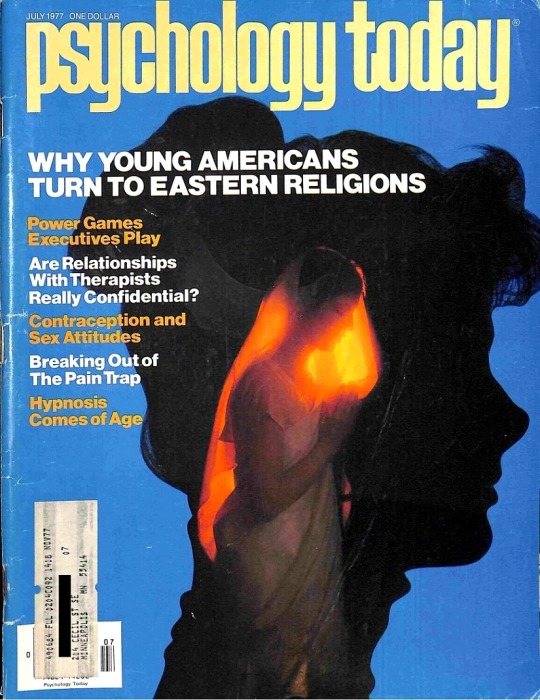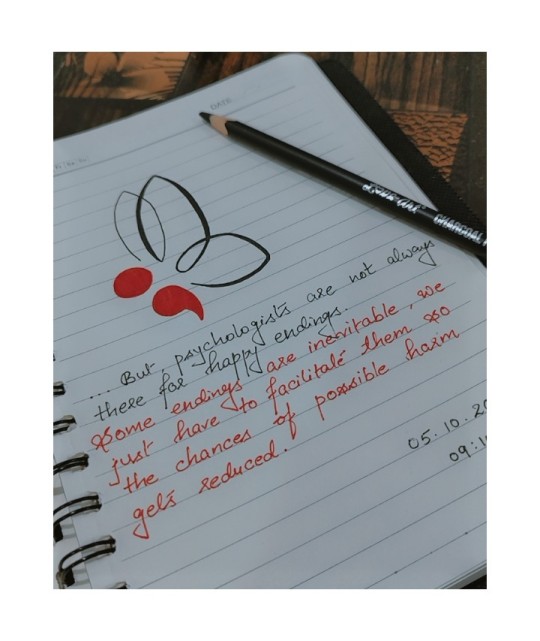#psychologists
Text
Please feel free to post why you do or don't go to therapy, experiences with different therapists, or anything else that might give more data.
#Notes by Nikki#therapy#therapists#mental health#mental illness#psychology#psychologists#talk therapy#mental wellness#poll#polls#tumblr#tumblr poll#tumblr polls#tumbling#tumblring
231 notes
·
View notes
Text
as extra information if you can, leave your country in the tags and whether you feel safe or not!
#mental health services#mental health#therapy#psychiatrists#psychologists#trauma recovery#healing#going to therapy
102 notes
·
View notes
Text

Psychology Today, magazine, Ziff-Davis Pub., July 1977
#witches#psychologists#occult#vintage#psychology today#eastern religions#ziff davis#july 1977#1977#magazine#ziff-davis#hypnosis
58 notes
·
View notes
Text
A genuine question for the economists, anthropologists, sociologists, psychologists, and anyone else who wants to join in of tumbler
please be respectful to each other and ideas presented.
#economy#economics#capitalism#competition#anthro#anthropology#Economists of tumblr#Economists#Anthropologists#anthropologists of tumblr#psychology#psychologists#Psychologists of tumblr#Sociology#sociologists#Sociologists of tumblr#Asks#deep thinking#random thoughts#just an observation#thoughts#ramblings#tumblr polls#my polls#deep thoughts#Creativity#novelty#novel#creative#Polls
38 notes
·
View notes
Text
friendly april fool’s day reminder to not prank anyone who suffers from psychosis. they already have a very fragile connection to reality, they don’t need you making it more difficult for them.
#mental health#mental health awareness#mental health support#mental health reminders#coping#positivity#reminders#therapy#wellness#kindness#psychosis#psychologists#therapists#mental wellness#depression#anxiety#trauma#dissociative disorders
19 notes
·
View notes
Text
Listen, listen. I take Carl Jung a whole lot more seriously than I could ever take Sigmund Freud, but one cannot forget that Jung was Freud's chosen protégé.
26 notes
·
View notes
Note
systems are formed through trauma, the brain doesnt just create another person in your head for funsies. would highly recommend talking to a therapist about all this
Sure! Let's get the opinions of some mental health professionals!
Veissière first stumbled across tulpamancy in a 2013 New York Times article, “Conjuring Up Our Own Gods,” penned by Tanya Marie Luhrmann, a Stanford professor whose work explores how people experience God. Veissière and Luhrmann started working together, and they have since partnered up with neuroscientist Michael Lifshitz, who specializes in the plasticity of human consciousness. Together, they’re conducting a formal cognitive study using MRIs to see what is transpiring at the neurological level in tulpamancers’ minds.
“My understanding is [that] hearing voices and communicating with identities, spirits, imaginary friends, tulpas �� it all draws on a completely normal propensity,” Veissière tells me in a phone interview. “This is nonpathological voice-hearing; tulpamancers have come to desire auditory and verbal hallucinations.” (Depending on whom you ask in the community, tulpas are not necessarily considered imaginary friends; many believe tulpas have their own minds.)
“There is a small but growing body of evidence that lives have been improved in this practice,” Veissière continues. “It helps individuals with social anxiety issues — it aids in theory of mind, the ability to relate to other people. Children who develop imaginary friends are better able to understand people in real life — they develop socio-cognitive abilities to infer what other people want and desire. It’s trainable.”
“If something doesn’t hurt, then it’s not pathological,” Lifshitz tells me on the phone. “Think about rumination. Maybe I think a lot, but it’s not depressive unless it’s making me depressed. Being disassociated — having the feeling of multiple agents living inside of you — in and of itself is not fundamentally pathological.”
“The thing that’s clear is that tulpamancy helps people,” Lifshitz continues. “Tulpamancy allows folks to feel more relaxed and better able to socialize. In fact, we’re interested in how we could use it for developing better treatments for those who do have DID or psychosis. Perhaps we can teach [patients] how to engage with voices or personalities in a way that might be useful [or] therapeutic.”
Or how about this:
Dr. Richard Loewenstein is a psychiatrist based in Baltimore. He’s one of the country’s experts on dissociative identity disorder and sees a lot of patients with this mental illness. I talk to him on Skype.
LOEWENSTEIN: Unity of self is probably more of an aspiration than a reality. And in our general culture we often refer to ourself as If it were divided. People will say well part of me wants this and part of me wants that or. You know. I wouldn't recognize myself ten years ago compared to how I am now or I'm not myself today.
But here’s Loewenstein explaining the key difference (between tulpamancy and DID):
LOEWENSTEIN: disorders have a distress category, which basically says the symptoms cause clinically significant distress or impairment in social, occupational, or other important areas of functioning.
And there’s another key difference between tulpamancers and DID patients.
LOEWENSTEIN: the disturbance is not a normal part of a broadly accepted cultural or religious practice.
And as I've referenced before, the creators of the Theory of Structural Dissociation have said that spirits in mediumship may also be "self-conscious dissociative parts of the personality."
Our definition of dissociation pertains to a division of the personality in the context of trauma. We are aware that this division may also occur in hypnosis and mediumship, that several other definitions of dissociation also address these other contexts, and that there are some indications that dissociation in these other contexts is also best understood as a division of personality. For example, Hilgard's well-known “hidden observer,” as found in some highly hypnotizable subjects, involves a dissociative part of the personality that is endowed with consciousness and self-consciousness, but the phenomenon is disputed (e.g., Kihlstrom, 1998; Kirsch & Lynn, 1998). Mediumship may involve conscious and self-conscious dissociative parts of the personality (Braude, 1995).
Isn't it funny how all these mental health professionals keep talking about ways your brain can make other people in your head other than trauma?
Maybe... just maybe... you should be the ones talking to therapists about this. Because I have yet to see any researchers into DID or other forms of plurality come away with the fervent endogenic denial I've seen from anti-endos. Actual professional opinions seem to fall on a spectrum from pro-endo to neutral.
It seems that being anti-endo is inherently anti-science. And this only will become true as more research is conducted.
#syscourse#psychiatry#psychology#mental health#mental illness#endogenic#pro endo#pro endogenic#plural#fakeclaiming#therapists#therapy#psychologists#psychiatrists#multiplicity#systems#system#system stuff#tulpa#tulpamancy
47 notes
·
View notes
Text

Note to self 🖋
#psychologists#counseling#life quotes#quotations#book quotes#book quote#quoteoftheday#beautiful quote#life quote#quotes#believe#eternal love#note to self#dear diary#diary#daily diary#safe place#safe space#work and travel
15 notes
·
View notes
Text
It’s very annoying that people with little to no education in psychology always of all things know that Sigmund Freud is connected to it. The general population gives him so much more credit than he deserves because they just completely misunderstand what role he had in founding psychology. Yes, he basically caused modern day psychology, but not because he was a genius or anything- it’s because he started making shit up about the human mind that was so insanely wrong and disgusting that an entire scientific field was created by actual scientists going ABSOFUCKINGLUTELY NOT and dedicating their lives to disproving him out of spite
#psychology#psychblr#psych#science#scientists#sciblr#science side of tumblr#psychology side of tumblr#science studyblr#sigmund freud#science tumblr#psychology today#modern science#psychologists#fuck sigmund freud#here’s 95 reasons why#education#educate yourselves#educate yourself#edublr
36 notes
·
View notes
Text

Admissions are open at Kannur University for MSc Clinical and Counselling Psychology program.
.
Check out the detailed article on our website to know more about the same.
.
Web: https://www.epsychology.in/blog/
#psychologystudent#psychologist#psychology101#psychologytoday#upseducation#psychology#psychologyfacts#psychologists#arvindotta#youtube
2 notes
·
View notes
Text
#psychologists#psychology#psixologiya#psixoloq#psikoloji#psikolog#psixoloji#psixolojik#psixologiyaaz#psixologiyaze#psychologyfacts#psychotherapy#psychoanalysis#psychiatry#psychologist
20 notes
·
View notes
Text
Psychology Today’s conversion therapy problem
“In 1992, religiously-motivated conversion therapist Joseph Nicolosi founded the National Association for Research and Therapy of Homosexuality. NARTH provided a ‘clinical’ hub for the ex-gay movement, and was a melting pot of pseudoscience ...
“In 2014, after realizing they’d fundamentally (eh, get it?) failed to convince the public that they were anything other than ardent homophobes, and that science had long since moved on to realized that being gay is not only non-pathological, but a natural part of human diversity, NARTH rebranded under the Association for Therapeutic Choice and Scientific Integrity. Like so much of the anti-LGBT, pronatalist far-right, ACTSI refocused on transgender people as part of a political strategy shift to ‘separating the T from LGBT’ ...
“One of the pivotal strategies during the early days of NARTH, was to focus on the specific language of ‘same-sex attraction’ ... Conversion Therapists wanted to inculcate the public with the idea that SSA was a test of one’s moral or religious convictions, but not a part of a person’s innate sexuality ...
"A cursory search of Google’s index of the site shows an alarmingly high rate of results for SSA ... [For mentions of] ‘sexual brokenness’, a term that comes from evangelical Christianity to describe having normal sexual feelings, you get 1,300 results, the overwhelming majority of which are in the United States. Among these results includes Joseph Nicolosi’s son. David Pickup, an LMFT who deals exclusively in the empirically disproven notion that ‘same sex attraction’ is the result of trauma and sexual abuse, is also listed on Psychology Today. Pickup has the distinction of being one of the more prolific purveyors of alleged ‘expert’ testimony on behalf of states like Florida and his home state of Texas.
“Perhaps just as disturbingly, it is host to a range of ‘Gender Exploratory Therapists’ like Lisa Marchiano, the original author of ‘Outbreak: On Transgender Teens and Psychic Epidemics’, an absolute nonsense paper which argues that the apparent rise in transgender youth is due to what Jungian psychoanalysts refer to as the ‘collective unconscious’ after too much LSD.”
#trans conversion therapy#gay conversation therapy#conversation therapy#therapy#therapists#psychology#psychologists#pseudoscience#christian evangelicals#christian fundamentalists#far right#conservatives#trans genocide#transphobia#transgender#trans#gender#gay#sexuality#usa
12 notes
·
View notes
Text
the next time my psychologist tells me there's nothing wrong with me im jumping off mt rushmore
#i don't even live in america#autism#adhd#boutta catch a flight#audhd#late diagnosed autistic#actually autistic#neurodivergent#ughhhhhh#psychologists#suck
5 notes
·
View notes
Text

A.E. Mander - To Understand People - Tartan Press - 1975
#witches#psychologists#occult#vintage#to understand people#tartan press#a.e. mander#alfred ernest mander#1975#psychology#matter-of-fact psychology#matter-of-fact
69 notes
·
View notes
Text
Journaling has done more for me than rehab and therapy ever did. Why? Bc no one gives a fuck about what you to say. It sucks, but that’s the reality.
Even the trained “professionals” who called me by Borderline and not even by my name.
Getting me to even show up and stay clean was hard enough. But having to check in with 4 other counselors, psychologists, psychiatrists, DBT classes, it still didn’t do much for me at all. No one was really listening to me.
But journaling is the perfect outlet for me. I can scream my truth into my writing, which always validates what I am feeling. I’ve had nothing in my life besides gaslighting and resistance.
I’ve come to the conclusion that people are dedicated to misunderstanding me.
Journaling for Emotional Wellness
When you were a teenager, you might have kept a diary hidden under your mattress. It was a place to confess your struggles and fears without judgment or punishment. It likely felt good to get all of those thoughts and feelings out of your head and down on paper. The world seemed clearer.
You may have stopped using a diary once you reached adulthood. But the concept and its benefits still apply as a grown up. Now it’s called journaling. It's simply writing down your thoughts and feelings to understand them more clearly. And if you struggle with stress, depression, or anxiety, keeping a journal can be a great idea. It can help you gain control of your emotions and improve your mental health.
Journaling benefits
One of the ways to deal with any overwhelming emotion is to find a healthy way to express yourself. This makes a journal a helpful tool in managing your mental health. Journaling can help you:
Manage anxiety
Reduce stress
Cope with depression
Journaling helps control your symptoms and improve your mood by:
Helping you prioritize problems, fears, and concerns
Tracking any symptoms day-to-day so that you can recognize triggers and learn ways to better control them
Providing an opportunity for positive self-talk and identifying negative thoughts and behaviors
When you have a problem and you're stressed, keeping a journal can help you identify what’s causing that stress or anxiety. Once you’ve identified your stressors, you can work on a plan to resolve the problems and reduce your stress.
Keep in mind that journaling is just one aspect of a healthy lifestyle for better managing stress, anxiety, and mental health conditions. To get the most benefits, be sure you also:
Relax and meditate each day.
Eat a healthy, balanced diet.
Exercise regularly—get in some activity every day.
Treat yourself to plenty of sleep each night.
Stay away from alcohol and drugs.
Use your journal to make sure you follow these guidelines daily.
How to journal
Try these tips to help you get started with journaling:
Try to write every day. Set aside a few minutes every day to write. This will help you to write in your journal regularly.
Make it easy. Keep a pen and paper handy at all times. Then when you want to write down your thoughts, you can. You can also keep a journal on your smartphone.
Write or draw whatever feels right. Your journal doesn't need to follow any certain structure. It's your own private place to discuss and create whatever you want to express your feelings. Let the words and ideas flow freely. Don't worry about spelling mistakes or what other people might think.
Use your journal as you see fit. You don't have to share your journal with anyone. If you do want to share some of your thoughts with trusted friends and loved ones, you could show them parts of your journal.
Keeping a journal helps you create order when your world feels like it’s in chaos. You get to know yourself by revealing your most private fears, thoughts, and feelings. Look at your writing time as personal relaxation time. It's a time when you can de-stress and wind down. Write in a place that's relaxing and soothing, maybe with a cup of tea. Look forward to your journaling time. And know that you're doing something good for your mind and body.
5 notes
·
View notes
Link

When we are going through a difficult period, it may be an extremely emotional experience. We may feel overwhelmed, anxious, scared, or even hopeless. It is important to let such emotions come out rather than suppressing them. But still, it is hard to let go of that state. When going through a troubled moment, counselling can be a lifeline. There are numerous benefits of counselling that you can take advantage of. A therapist can assist you in processing your experiences and provide advice on how to best manage challenging emotions. Connect with our counsellors today!
#online therapist#online counselling#psychologists#online therapy india#mental health problems#mental health support
8 notes
·
View notes